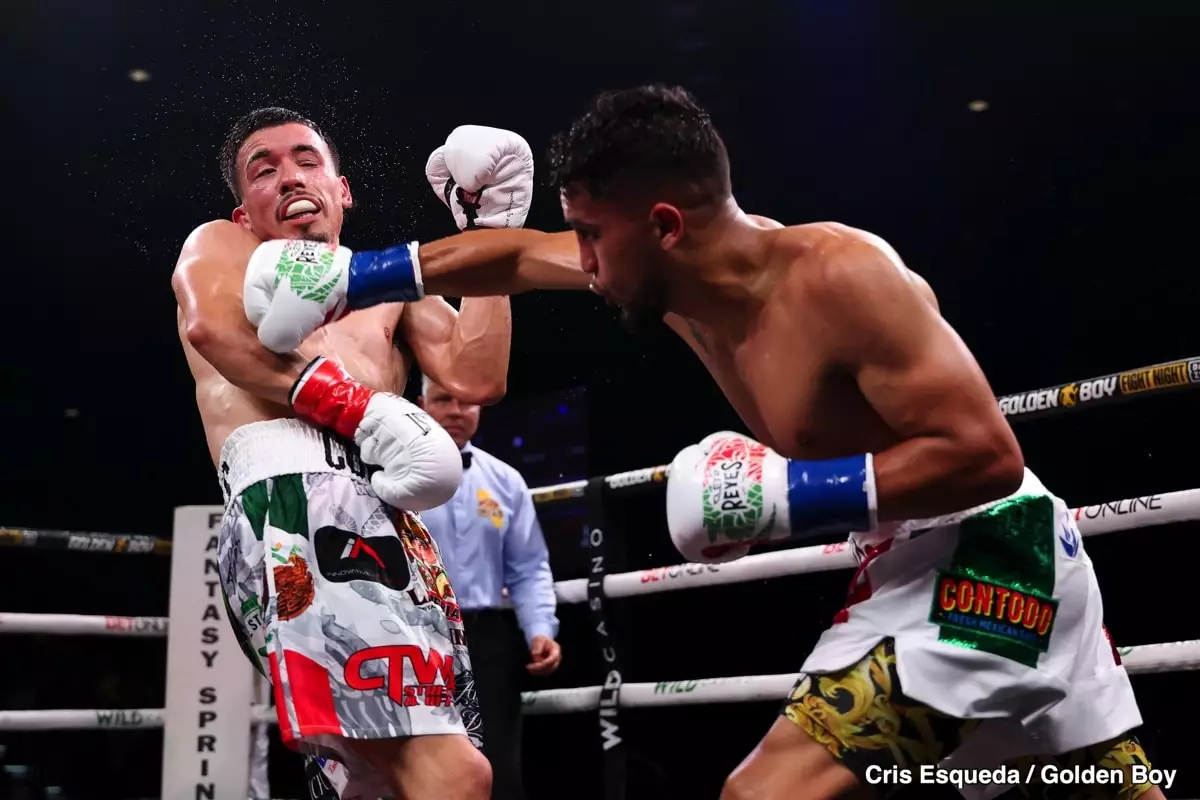In a bout that left fans breathless and critics pondering the very essence of judging in boxing, Manuel “Gucci Manny” Flores and Jorge Chavez delivered a ten-round spectacle that tested more than just their physical limits. The arena was packed, a testament to the fighters’ growing influence and the sport’s enduring appeal. But what transpired inside the ring extended beyond technical prowess—revealing the complex dance between grit, strategy, and subjective perceptions that define boxing.
The judges’ decision to declare a majority draw, despite the clear effort by both fighters, underscored a deeper issue: the thin line separating victory from ambiguity. Cards reading 93-97, 95-95, 95-95 were anything but conclusive, sparking genuine outrage from Chavez, who questioned the legitimacy of what he perceived as a miscarriage of justice. His words cut through the post-fight haze—”What were the judges watching?”—highlighting the disconnect between fighter perception and judging criteria. Chavez’s claim that his facial cut resulted from a headbutt, not a punch, reflected a frustration not merely with the result but also with the sport’s perceived unpredictability and inconsistent officiating.
Flores’s response was matter-of-fact yet revealing. His acknowledgment that he stayed respectful and cautious early on suggests a boxer prudent enough to avoid unnecessary risks, but it also hints at a strategic flaw—playing it safe in a fight that might have called for more aggression. His concession, “Next time I won’t,” reveals an internal resolve to push the pace, hinting that he recognizes the importance of asserting dominance early, rather than leaving the outcome to the judges’ whims. This lethal dance of tension and restraint exposed not just the fighters’ styles but the underlying vulnerabilities both shared.
What remains striking about this outcome is the palpable disconnect between action and judgment. Chavez believed he had done enough, while Flores was perhaps content with a draw that could have easily swung the other way. The real question emerges: Were the judges just spectators waiting for the bell, or were their biases—intentional or otherwise—clouding their impartiality? The notion that judges might be “waiting for the nachos” trivializes the gravity of their role in boxing’s integrity, but it also raises uncomfortable truths about how some decisions are made. The call for transparent, fair judging is not a mere plea but an urgent necessity if boxing is to sustain credibility.
Meanwhile, the undercard fights painted a contrasting picture of clarity and competence. Farid Ngoga tactfully outboxed Jordan Panthen to claim victory via majority decision—an example of strategic competence triumphing over hype and false bravado. Ngoga’s calm, calculated approach starkly contrasted with Panthen’s more flamboyant, yet ultimately ineffective, style. This fight served as a reminder that discipline and intelligence often beat raw power and showmanship—a lesson that fighters should heed if they aim to succeed long-term.
The physical toll of the night was evident in Todd Manuel’s injury, ending his fight prematurely with a hand injury after just two rounds. Yet, his resilience and still-untarnished record exemplify the indomitable spirit that boxing cultivates. Conversely, Cayden Griffiths continued his perfect run, showcasing that relentless drive and power are vital ingredients for success. His knockout of David Ramirez, delivered with a precise hook, demonstrated an evolving fighter who is just beginning to tap into his potential, hinting at bigger things on the horizon.
The night also affirmed that seasoned fighters like Leonardo “Bazooka” Sanchez and Fabian Guzman remain a dangerous force. Sanchez’s relentless assault culminated in a decisive fourth-round knockout—an example of a fighter living up to his nickname and establishing himself as a genuine threat. Guzman’s unanimous decision over Arregui reaffirmed that technical skill and consistency still hold sway, especially when judges align in their assessments. These victories underscore that in boxing, perseverance and strategic mastery can carve out paths amidst chaos.
The preliminary fights further illustrated boxing’s unpredictability and the importance of clarity. Bryan Lua and Kevin Piedrahita’s draw was an impasse—neither willing to concede control, each seeking victory but ultimately settling for a split decision that echoed the night’s theme: sometimes, the fight is less about domination and more about survival. Javier Meza’s comfortable decision over Cesar Villarraga brought much-needed legitimacy to the undercard—an example of precise, clean boxing that critics often overlook in favor of spectacle.
This event, with its highs and lows, encapsulates the essence of boxing: a sport where talent meets controversy, resilience meets scrutiny, and victory is sometimes determined by the invisible hand of justice—whether it’s the judges’ calls or fighters’ spirit. What remains undeniable is that boxing continues to be a brutal, beautiful ritual—a test of character, resolve, and integrity, reminding us why we watch and why we fight.

